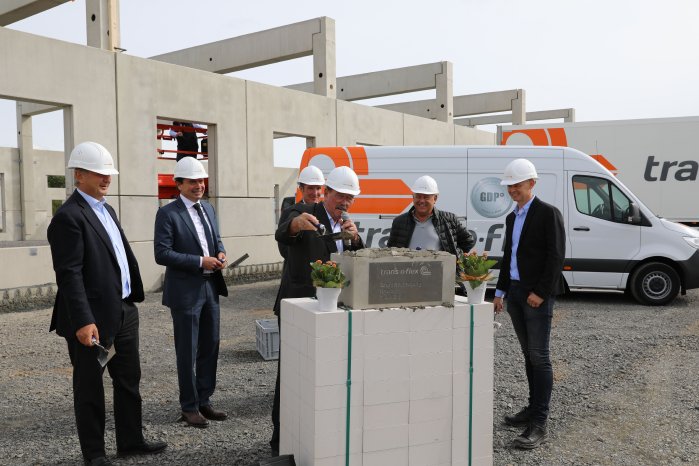- Investment of 13 million euros in modern sorting centre increases capacity of trans-o-flex Express and trans-o-flex ThermoMed networks
- Handling in two temperature zones at 2 to 8 and 15 to 25 degrees
- Company obtains electricity almost exclusively from solar and wind energy and has improved CO2 efficiency by 18 %.
Previously separate facilities for the transport of chilled pharmaceuticals (2 to 8 °C) in the trans-o-flex ThermoMed network and of medicines in the room temperature range (15 to 25 °C) in the trans-o-flex Express network will be combined at the new centre. For this purpose, separate cold storage cells are being installed in the hall, where consignments can be sorted and handled at a temperature between 15 and 25 °C, for handling at 2 to 8 °C. At the new site, trans-o-flex will have a total of 81 loading and unloading gates with only around 5,000 square metres of hall space. This is why the entire handling centre will look like a big Y when viewed from above. This is because this shape reduces the amount of space required and optimises handling. Albeck: "With the same handling space, we can install more loading and unloading gates in the Y-shaped construction compared to the classic square. We also shorten the sorting distances in the hall and thus save time in daily operations." The centre in Driedorf is due to commence operations in spring 2021.
"We chose this location because it is ideally situated for our two networks, trans-o-flex Express and trans-o-flex ThermoMed," continued Wolfgang P. Albeck, trans-o-flex CEO at the laying of the foundation stone. Without having to pass through the town of Driedorf, the trans-o-flex vehicles reach the B255 east-west link road in one minute and the A45 south-north link road in 9 minutes. "Last but not least, we are pleased that our new transshipment centre is located directly next to a solar farm that converts solar energy into electricity," said Albeck. "This is a wonderful illustration of trans-o-flex's approach of bringing together economic and ecological thinking and action." Since 2008, trans-o-flex has been obtaining its electricity almost exclusively from renewable energy sources, and the sustainability report, which the company publishes annually, documents the development of trans-o-flex's carbon footprint. According to this report, the company has improved its CO2 efficiency (the emissions per transported kilogramme) since 2007 by 17.7 % despite the fact that with active temperature control a particularly energy-intensive form of transport was introduced. In the last reporting year alone, emissions of particulate matter (PM10) fell by around 1,000 tonnes, nitrogen oxides (NOx) by as much as 44,000 tonnes and CO2 by 6,000 tonnes.
Carsten Braun, Mayor of Driedorf, paid special tribute to this achievement by trans-o-flex at the laying of the foundation stone. "We are pleased not only because with trans-o-flex we are getting a company that is creating jobs here," said the 42-year-old. "Rather, trans-o-flex is very conscious of its responsibility as a logistics service provider and as a company that primarily transports pharmaceuticals and other sensitive goods. Not least during the coronavirus crisis, it has made an important contribution to supplying the population not only with medicines, but also with disinfectants and urgently needed protective equipment. The fact that this company has been continuously reducing its CO2 footprint for more than ten years is a great example for me of how economic efficiency and environmental protection can go together."


